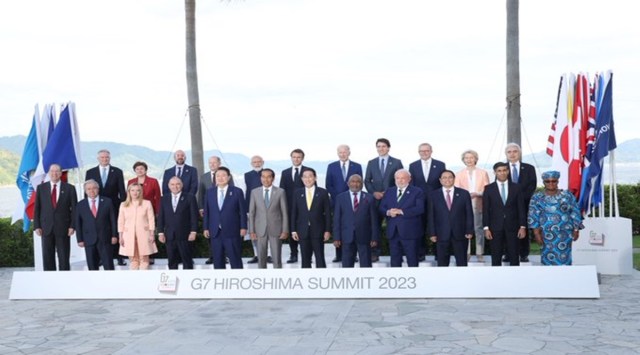G7 wants countries like India to turn net zero by 2070, ‘peak’ emissions by 2025
G7 says fresh investments in gas legitimate response to Ukraine crisis.
 If large emitters like China and India do not meet 'net zero' targets in 2050, it would mean that the developed countries would need to turn net zero much before that. (Photo/Twitter/PMO)
If large emitters like China and India do not meet 'net zero' targets in 2050, it would mean that the developed countries would need to turn net zero much before that. (Photo/Twitter/PMO) The G7 countries have asked all major economies — countries like India and China — to commit to attaining a net-zero emissions status by 2050 “at the latest”. The communique released on Saturday after the meeting of G7 leaders in Hiroshima, Japan, also calls upon the major economies to let their greenhouse gas emissions ‘peak’ no later than 2025.
These are new demands from G7 countries, and go completely against stated positions till now. It has been well acknowledged that developing countries like India would have longer timeframes to let their emissions ‘peak’ or attain the net-zero status. The G7 communique, which is substantially devoted to issues of climate change and energy transition, as in the last few years, does not name India or any other country, and refers to major economies instead.
Net zero refers to a state wherein the emissions of greenhouse gases by a country are offset by absorption, or removal, through futuristic technologies, so that the net emissions from the country are zero. India has said it would turn net zero only by 2070 while China has set a target of 2060. Russia and Saudi Arabia, also amongst major economies, have also set 2060 as their net zero targets. On the issue of ‘peaking’, China has indicated — not promised — that its emissions would peak around 2030, India sees its emissions continue to grow well into the next decade.
Science says that the world as a whole must reduce its emissions by at least 45 per cent from 2005 levels by 2030, and must become net zero by 2050, in order to have any realistic chance of keeping temperature rise within 1.5 degree Celsius from pre-industrial times. But the bulk of the obligation for ensuring this lies on the rich and developed countries which are considered primarily responsible for causing global warming. Countries like India are allowed greater space and flexibility in setting these targets for themselves.
Most of the developed countries set 2050 net zero targets for themselves. But if large emitters China and India do not reach there in 2050, it would mean that the developed countries would need to turn net zero much before that for the world as a whole to meet that target by mid-century. As of now, only Germany has 2045 as its target year.
The G7 demands are likely to be ignored by countries like India, not the least because the communique does not ask the rich and industrialised countries to also do something extraordinary to respond to the urgency of climate change.
Instead, the G7 patted its back for not shifting its 2050 net zero goals despite the energy crisis precipitated by the war in Ukraine.
“While Russia’s war of aggression against Ukraine impacts energy markets and supply chains globally, our goal to achieve net-zero greenhouse gas emissions by 2050 at the latest remains unchanged,” the communique said.
Even on the issue of finance, the G7 countries only reiterated the position that developed world would start delivering on its promise of mobilizing US$ 100 billion per year for the period 2020 to 2025 from this year. There was no mention of scaling up this amount for the post-2025 period, which is a matter under negotiation.
But what angered climate activists the most was the mention of fresh investments in atmosphere-polluting gas sector in order to reduce the dependence on Russian energy.
“In this context, we stress the important role that increased deliveries of LNG (liquified petroleum gas) can play and acknowledge that investment in the sector can be appropriate in response to the current crisis and to address potential gas market shortfalls provoked by the crisis,” the communique said.
Harjeet Singh of Climate Action Network International said this was fresh evidence of hypocrisy and lack of leadership from the world’s richest nations on the most pressing issue of our times.
“The G7, among the richest nations in the world, have once again proved to be poor leaders on climate. Paying lip service to the need to keep temperature rise below 1.5 degree Celsius while at the same time continuing to invest in gas shows a bizarre political disconnect from science and a complete disregard for the severity of climate emergency,” Singh, head of global political strategy at Climate Action Network International said.







